|
Books Should Be Free Loyal Books Free Public Domain Audiobooks & eBook Downloads |
|
|
Books Should Be Free Loyal Books Free Public Domain Audiobooks & eBook Downloads |
|
Literature |
|---|
|
Book type:
Sort by:
View by:
|
By: Jonathan Swift (1667-1745) | |
|---|---|
 Tale of a Tub
Tale of a Tub
A Tale of a Tub was the first major work written by Jonathan Swift, composed between 1694 and 1697, that was eventually published in 1704. It is arguably his most difficult satire, and perhaps his most masterly. The Tale is a prose parody which is divided into sections of "digression" and a "tale" of three brothers, each representing one of the main branches of western Christianity. A Tale was long regarded as a satire on religion itself, and has famously been attacked for that, starting with William Wotton... | |
 Three Sermons: I. on mutual subjection. II. on conscience. III. on the trinity
Three Sermons: I. on mutual subjection. II. on conscience. III. on the trinity
| |
 The Journal to Stella
The Journal to Stella
| |
 Bickerstaff-Partridge Papers
Bickerstaff-Partridge Papers
| |
By: Jean de La Fontaine (1621-1695) | |
|---|---|
 Fables in Rhyme for Little Folks
Fables in Rhyme for Little Folks
Several of La Fontaine’s fables, translated into English by W. T. Larned. | |
 Fables of La Fontaine — a New Edition, with Notes
Fables of La Fontaine — a New Edition, with Notes
| |
 Old Man and the Ass
Old Man and the Ass
LibriVox volunteers bring you 8 recordings of The Old Man and the Ass by Jean de La Fontaine. (There was no translator acknowledged in the text.) This was the Weekly Poetry project for July 7, 2013.Jean de La Fontaine was the most famous French fabulist and one of the most widely read French poets of the 17th century. He is known above all for his Fables, which provided a model for subsequent fabulists across Europe and numerous alternative versions in France, and in French regional languages.According to Flaubert, he was the only French poet to understand and master the texture of the French language before Hugo... | |
 The Original Fables of La Fontaine Rendered into English Prose by Fredk. Colin Tilney
The Original Fables of La Fontaine Rendered into English Prose by Fredk. Colin Tilney
| |
 Quotes and Images From The Tales and Novels of Jean de La Fontaine
Quotes and Images From The Tales and Novels of Jean de La Fontaine
| |
By: Anthony Trollope (1815-1882) | |
|---|---|
 Barchester Towers
Barchester Towers
Second in the series of novels set in the fictional cathedral town of Barchester, the reader is treated to a hilarious, if unseemly, competition for domination of the diocese! The contenders in Barchester Towers are Mrs. Proudie the wife of the mild, sadly henpecked bishop and Mr. Slope his slimy and devious chaplain. When the beloved former bishop suddenly dies, a complete outsider is brought in to take his place. Instead of the bishop's son, Archdeacon Grantly, whom the entire parish was expecting, a more low-church minister, Bishop Proudie is given the post... | |
 Can You Forgive Her?
Can You Forgive Her?
The first book in the political Palliser series, the novel deals with parliamentary politics, while concurrently devoting its pages to much more intricate issues. Presenting three parallel stories, the parliamentary novel draws its attention to three contrasting young women, who are beset with arduous decisions concerning courtship and marriage. Additionally, the novel covers topics including women in conventional society and their discernment, while illustrating the tentative stages of marriage with all the attributes of sacrifice, compromise and temptation... | |
 The Way We Live Now
The Way We Live Now
The Way We Live Now is a scathing satirical novel published in London in 1875 by Anthony Trollope, after a popular serialization. It was regarded by many of Trollope’s contemporaries as his finest work. One of his longest novels (it contains a hundred chapters), The Way We Live Now is particularly rich in sub-plot. It was inspired by the financial scandals of the early 1870s, and lashes at the pervading dishonesty of the age, commercial, political, moral, and intellectual. It is one of the last memorable Victorian novels to have been published in monthly parts. | |
 The Eustace Diamonds
The Eustace Diamonds
Lizzie Greystock, a fortune-hunter who ensnares the sickly, dissipated Sir Florian Eustace, is soon left a very wealthy widow and mother. While clever and beautiful, Lizzie has several character flaws; the greatest of these is an almost pathological delight in lying, even when it cannot benefit her. Before he dies, the disillusioned Sir Florian discovers all this, but does not think to change the generous terms of his will. The diamonds of the book’s title are a necklace, a Eustace family heirloom that Sir Florian gave to Lizzie to wear... | |
 Phineas Finn
Phineas Finn
Phineas Finn is the sequel to “Can you Forgive Her?” and the second novel in Trollope’s Palliser series. The eponymous hero is a young Irishman who becomes a member of the English parliament. Trollope aspired to become an M.P. himself, and he ably describes the workings of the English political scene. There is also a love interest, as the somewhat inconstant Phineas courts three different women: his Irish sweetheart, Mary Flood Jones; Lady Laura Standish, the daughter of a prominent Whig politician; and a lovely heiress, Violet Effingham. | |
 Ayala's Angel
Ayala's Angel
Lucy and Ayala Dormer are left penniless by the death of their parents. Ayala is taken in by their rich aunt Lady Tringle and Lucy by their poor uncle Mr Dosett. The girls find it hard to get used to their new surroundings. Lucy becomes engaged to one of her father’s artist friends but they are too poor to marry. Three different men fall in love with Ayala but none live up to her ideal of the perfect man. Will Lucy be able to marry her sweetheart and will Ayala find her ‘Angel of Light’? For the answers to these and many other questions, read this book. | |
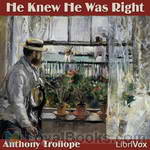 He Knew He Was Right
He Knew He Was Right
He Knew He Was Right is a 1869 novel written by Anthony Trollope which describes the failure of a marriage caused by the unreasonable jealousy of a husband exacerbated by the stubbornness of a wilful wife. As is common with Trollope’s works, there are also several substantial subplots. Trollope considered this work to be a failure; he viewed the main character as unsympathetic, and the secondary characters and plots much more lively and interesting. | |
 Phineas Redux
Phineas Redux
Phineas Redux is the fourth in Trollope’s series of six Palliser novels. At the end of Phineas Finn, the second novel in the series, Phineas had to return to Ireland to marry his childhood sweetheart, who was expecting their child. As Phineas Redux opens, Phineas is working as a Poorhouse Inspector in Ireland. His wife having died in childbirth, he finds his existence dull and unsatisfying. Phineas’ returns to England; his career advances and his romantic adventures continue, while we encounter many familiar characters including Glencora and Plantagenet Palliser, Madame Goesler, and Lizzie Eustace and her husband the Reverand Mr. Aemelius. | |
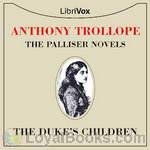 The Duke's Children
The Duke's Children
In the last of the six Palliser novels, the sudden death of his wife, Lady Glencora, leaves Plantagenet Palliser, the Duke of Omnium, finding himself in charge of his three children. The eldest, Lord Silverbridge, has recently been expelled from Oxford; his younger brother, Gerald, is about to enter Cambridge; and the youngest, nineteen-year old Lady Mary, has imprudently formed an attachment to Francis Tregear, who, while certainly a gentleman, unfortunately has no income. Before her death, Glencora knew (and approved) of her daughter's attachment; the Duke, however, does not know of it, and is not at all likely to approve... | |
 Doctor Thorne
Doctor Thorne
MANUAL OF SURGERY, OXFORD MEDICAL PUBLICATIONSBY ALEXIS THOMSON, F.R.C.S.Ed.PREFACE TO SIXTH EDITION Much has happened since this Manual was last revised, and many surgical lessons have been learned in the hard school of war. Some may yet have to be unlearned, and others have but little bearing on the problems presented to the civilian surgeon. Save in its broadest principles, the surgery of warfare is a thing apart from the general surgery of civil life, and the exhaustive literature now available on every aspect of it makes it unnecessary that it should receive detailed consideration in a manual for students... | |
 The Prime Minister
The Prime Minister
The Prime Minister is the fifth in Trollope's series of six Palliser novels. With Phineas' difficulties resolved, Trollope introduces new characters. A respectable young girl forsakes the man her family had always intended her to marry when she falls in love with a man of foreign extraction and an unknown family. He has a gentleman's education and manners, but his family background and financial means are mysterious. Is he really a gentleman? Meanwhile, Plantagenet Palliser becomes Prime Minister of a shaky coalition government, and Glencora and Madame Goessler are busy with the ensuing social obligations. | |
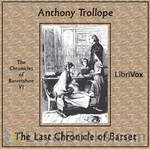 The Last Chronicle of Barset
The Last Chronicle of Barset
Both Trollope and some of his later critics have considered The Last Chronicle to be his greatest novel. Many of its characters are familiar from the earlier Barsetshire novels, including the Rev. Josiah Crawley, the impoverished curate of Hogglestock, whose alleged theft of £20, together with the efforts of many to clear up the mystery, lie here at the center. Central also is the trying courtship between Major Grantly and Grace Crawley, the clergyman's daughter, over the objections of the Major's parents, Archeacon Grantly and his wife; and the adventures of Johnny Eames, a protagonist of the Small House at Allington... | |
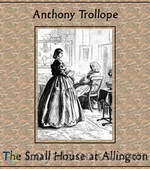 The Small House at Allington
The Small House at Allington
Fifth novel in the Barsetshire series, The Small House at Allington is largely focused on the Small House's inhabitants, Mrs. Dale and her two marriageable daughters, Lily and Bell. The two girls, of course, have suitors: their cousin, Bernard Dale, his friend Adolphus Crosbie, and the local boy, Johnny Eames, whose career in London is to mark him as far more than the "hobbledehoy" that he has earlier been considered. Crosbie is a social climber, and his connection with the dysfunctional de Courcys of Barsetshire give the author a chance for a splendid portrayal of an aristocratic family in decline... | |
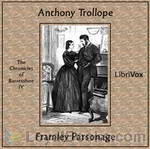 Framley Parsonage
Framley Parsonage
Framley Parsonage is the fourth novel in Anthony Trollope's series known as the "Chronicles of Barsetshire", first published in serial form in the Cornhill Magazine in 1860. "Of all novelists in any country, Trollope best understands the role of money. Compared with him even Balzac is a romantic." — W. H. Auden | |
 Orley Farm
Orley Farm
Orley Farm is Trollope at his best (as good as the Barsetshire series), which means some of the best characterizations in the English language. Trollope's people are real; the beleaguered Lady Mason, charged with forging a will; the aged lover Sir Peregrine Orme; Madeleine Stavely, deeply but practically in love; the shallow, fickle Sophia Furnival and others are 3-dimensional figures that live and breathe. His satire of the so-called "justice" system is the best kind of satire: he just describes the court proceedings as they really are. The result is as up-to-date as today's newspaper. (Introduction by Leonard Wilson) | |
 The American Senator
The American Senator
The American Senator is a novel written in 1875 by Anthony Trollope. Although not one of Trollope's better-known works, it is notable for its depictions of rural English life and for its many detailed fox hunting scenes. In its anti-heroine, Arabella Trefoil, it presents a scathing but ultimately sympathetic portrayal of a woman who has abandoned virtually all scruples in her quest for a husband. Through the eponymous Senator, Trollope offers comments on the irrational aspects of English life. (Description by Wikipedia) | |
 Miss Mackenzie
Miss Mackenzie
The thirty-five year-old (hence utterly over-the-hill) Miss Margaret Mackenzie, having devoted her life to others, suddenly finds herself with no one to care for, and in possession of a moderate fortune. Having money, she is now much sought-after and no longer universally deemed too old to marry. Partly because she has spent her life taking care of the brother whose money she has now inherited, she has no experience of wealth or popularity. Miss Mackenzie is the definition of “other-oriented. (Indeed, Trollope originally considered naming the novel, and his heroine, “Griselda”, presumably to invoke the folkloric character’s qualities of stolid obedience and endless patience... | |
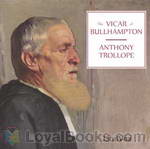 The Vicar of Bullhampton
The Vicar of Bullhampton
This little-known but engrossing Trollope novel, published in 1870, centers on a feisty small-town clergyman, his cantankerous neighbor, the miller, and the women in both their lives. A murder, a trial, a feud, a fallen woman, and a complicated romance are woven together in an exploration of the limits of our ability to truly do right when we involve ourselves in the lives of others, even with the best intentions. (Introduction by Angela Rowland) | |
 The Three Clerks
The Three Clerks
The Three Clerks was Trollope’s sixth novel and was written mostly in railway carriages, since his work for the Post Office still entailed a good deal of travelling; to make life easier for himself, Trollope had devised what he called his ‘tablet’, a square block which he rested upon his knees in such a way that he could write in complete comfort. The story is drawn from his memories of his work (as a clerk) at the GPO in St Martin-le-Grand, and it is considered the most autobiographical of Trollope’s novels – a story of the differing fortunes of 3 young men working at “Weights and Measures” and their relationships with a family of 3 sisters. | |
By: Trollope, Anthony (1815-1882) | |
|---|---|
 Belton Estate, The
Belton Estate, The
Clara Amedroz is the virtuous, intelligent, and quick-witted heroine of this novel. Like all women of her time, she has few options other than to marry. She is lucky enough to have two eligible suitors, and chooses the more urbane and worldly of the two. Alas, however, she realizes fairly quickly that Captain Aylmer is not a nice person. Throughout much of the novel we find her trying hard not to recognize that Will Belton - the suitor she rejected, and who still loves and wants to marry her - is... | |
By: Anthony Trollope (1815-1882) | |
|---|---|
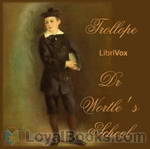 Doctor Wortle's School
Doctor Wortle's School
Anthony Trollope’s fortieth novel, published in 1881, concerns a respectable Christian boys’ school whose proprietor unknowingly hires a woman who apparently has two husbands: A devoted English scholar and an abusive drunkard from the American south. The book interweaves a sensitive and realistic exploration of Dr. Wortle’s moral dilemma with a humorous look at small-town gossip and--of course--a romance involving the doctor’s beautiful young daughter. ( | |
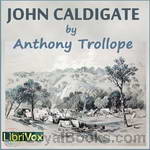 John Caldigate
John Caldigate
After a rather dissolute youth and having been disowned by his father, John Caldigate sets sail for Australia with his friend Dick Shand hoping to make his fortune in the goldfields in New South Wales. On the voyage, he meets Euphemia Smith and they conduct an indiscreet affair aboard. After various problems, Caldigate literally strikes gold and returns to Sydney where he meets Euphemia again and they settle, living as man and wife. After a time, they quarrel and Caldigate returns to England. On his return, Caldigate meets and marries a previous acquaintance, Hester Bolton, and they have a son... | |
 Is He Popenjoy ?
Is He Popenjoy ?
Trollope returns in Is He Popenjoy to two of his favorite subjects: property and inheritance. As in "Doctor Thorne," the issues are complicated by the specter of possible illegitimacy. Lord George Germain, a thoroughly respectable, upstanding, if not particularly bright younger son with new wife, rather expects to inherit a title, since his vicious and dissolute elder brother, the Marquis of Brotherton, who lives in Italy, shows no signs of settling down and producing heirs. Then comes a thunderbolt in the form of a letter from the Marquis suddenly claiming that he has, late in life, married an Italian widow and sired a son... | |
 Cousin Henry
Cousin Henry
Indefer Jones struggles to name an heir to his estate. Will he choose his favorite niece, Isabel, or a male heir? The story turns on the trouble that arises when Indefer fails to tell anyone his final decision before passing away. | |
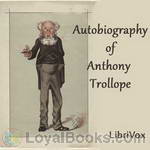 Autobiography of Anthony Trollope
Autobiography of Anthony Trollope
Anthony Trollope's autobiography will delight you whether or not you've read (or listened to) any of his many works. His honest if self-deprecating tone is at times hilarious and at times piteously moving. His detailed descriptions of his writing process and his philosophy of writing as work rather than art are fascinating. Fans of Trollope will enjoy learning the man's perceptions of his novels' shortcomings and triumphs. Anyone will appreciate learning about his years devoted to churning out literature for profit while working full time with the post office. | |
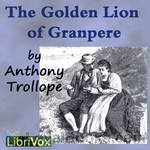 The Golden Lion of Granpere
The Golden Lion of Granpere
Time to do a short Continental trip with Trollope and see if we agree with Walpole. "...not only Trollope's very best shorter book, but one of the most charming idylls in English literature. - . . It has all the colour and richness and cohesion of something done irresistibly." -Walpole . The storyline is simple - boy meets girl - parents object - trials and tribulations follow - and then the story reaches it's conclusion - but you will need to find what that is for yourself ! | |
 Mr Scarborough's Family
Mr Scarborough's Family
MR SCARBOROUGH, wealthy owner of Tretton Park in Staffordshire, is dying. His eldest son and heir Mountjoy has gambled away his inheritance to avaricious money-lenders who hold post-obits to the entire value of the estate.Then Mr. Scarborough declares Mountjoy illegitimate. He claims that he only married his wife shortly before the birth of his second son Augustus, thus making him the real heir. Is this the truth ? - or a ploy to save the estate falling into the hands of some rather shady money lenders ? ....... | |
 Castle Richmond
Castle Richmond
| |
 Kept in the Dark
Kept in the Dark
Kept in the Dark is a novel by the 19th century English novelist Anthony Trollope. It was published in eight monthly installments in 1882, and also in book form in the same year. Cecilia Holt ends her engagement to Sir Francis Geraldine because of his indifference to her; she goes abroad and meets Mr George Western, who has been jilted by a beautiful girl. They marry but she does not tell him she has been previously engaged, although he has told her his story. When Western is informed of the previous engagement by Sir Francis, Western leaves his wife and goes abroad; she returns to Exeter to live with her mother... | |
 The Fixed Period
The Fixed Period
| |
 Aaron Trow
Aaron Trow
What is it like to be a fox hunted by hounds? We find out through the senses of an escaped convict as he struggles to free himself from would-be captors. The struggle is brutal. In the end, we are left wondering which person really wins--the pursued or the pursuer. Or perhaps which one is now the pursuer, which the pursued. | |
 An Old Man's Love
An Old Man's Love
This was Trollope's last completed novel, and he may have acquired his sympathy for older lovers with age! A not-so-very-old man, Mr. Whittlestaff, dearly loves Mary Lawrie, the girl he provides a home for after her father's death. He wishes to marry her, and she reluctantly accepts him, but warns him of her deep regard for a young man she had known years earlier. That Mr. Gordon had not exactly engaged her, but had gone off to seek his fortune and had not communicated with Mary ever since. Shortly after Mary accepts Mr. Whittlestaff, Gordon shows up. Trollope works out a final arrangement which resolves the quandary, but not with comfort. (Arnold Banner) | |
 An Unprotected Female at the Pyramids
An Unprotected Female at the Pyramids
| |
 Macdermots of Ballycloran
Macdermots of Ballycloran
This is the story of the Macdermots of Ballycloran the story is about the tragic demise of a landowning family. Larry Macdermot lives in a dilapidated mansion in Co. Leitrim, whose mortgage to Joe Flannelly he cannot keep up. Enmity between the Macdermot and Flannelly families is sharpened by son Thady's having declined to marry Joe Flannelly's daughter, Sally. Macdermot's daughter, Feemy, is herself seduced by the locally hated English police officer, Captain Myles Ussher. This was Trollope's first published novel, which he began in September 1843 and completed by June 1845. However, it was not published until 1847. | |
 The Courtship of Susan Bell
The Courtship of Susan Bell
| |
 The Mistletoe Bough
The Mistletoe Bough
| |
 The Man Who Kept His Money in a Box
The Man Who Kept His Money in a Box
| |
 Struggles of Brown, Jones, and Robinson
Struggles of Brown, Jones, and Robinson
Billed as a satire concerning the dishonest advertising and business practices of the day, it tells the tale of an upstart clothing business doomed from the get-go to utter failure. Its senior partner (the elderly Brown, who provides the investment) is far too timid for business. His son-in-law (Jones, who runs the store) is stealing from the till, and the junior partner, Robinson (who writes advertisements for the store) is so obsessed with the idea that advertising alone will drive the business, he uses up every last penny of the capital investment in a series of increasingly ludicrous ad campaigns and publicity stunts... | |
 The Kellys and the O'Kellys
The Kellys and the O'Kellys
| |
 Hunting Sketches
Hunting Sketches
| |
 Ralph the Heir
Ralph the Heir
As usual, Trollope creates a nice variety of characters of different English classes, sentiments and positions. The primary themes are the inheritance of property, extravagance or reason in the spending of assets, the mating of young people, and the electoral practices of the time. The election chapters are based on Trollope's own experiences when he ran for Parliament.There are, of course, many subplots which allow Trollope to express, through dialog, his opinions about greed, snobbery, work ethics and dandyism... | |
 Thackeray
Thackeray
| |
 The Parson's Daughter of Oxney Colne
The Parson's Daughter of Oxney Colne
| |
 A Ride Across Palestine
A Ride Across Palestine
| |
 Nina Balatka
Nina Balatka
A romance set in Prague between a Catholic and a Jew. In this short novel, Trollope moves away from his usual milieu to explore a theme which has universal resonance. | |
 Returning Home
Returning Home
| |
 Miss Sarah Jack of Spanish Town, Jamaica
Miss Sarah Jack of Spanish Town, Jamaica
| |
 Chateau of Prince Polignac
Chateau of Prince Polignac
| |
 Relics of General Chasse
Relics of General Chasse
| |
 The House of Heine Brothers
The House of Heine Brothers
| |
 La Mere Bauche
La Mere Bauche
| |